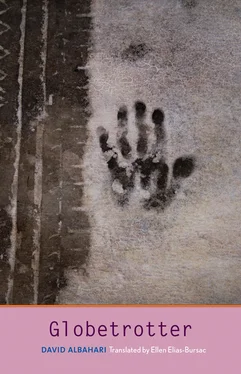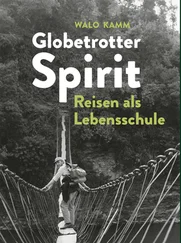Daniel Atijas looked at his watch and nodded. Ivan Matulić’s grandson again led the way, but now I went after him, leaving Daniel Atijas to wrestle with his map as it puffed up with wind while he folded it, and to run after us as if he wanted to conquer the first slope at a jog. Later, once we’d crossed the road with the same name as the mountain, the going got easier, the slope was less steep, the trail meandered gradually, the pines and fir trees gave off a pleasant scent, but before that, while we were still on the first part of the climb, I really thought I’d give up, that I’d plop right down on the ground, just as Ivan Matulić’s grandson had wanted to, and slide back downhill to the parking lot. I hoped, of course, that this would convince Daniel Atijas to return, but he quickly passed me, panting, it’s true, but not as much as I, and went on hiking right next to Ivan Matulić’s grandson. They immediately struck up, or rather resumed, their conversation, picking up, I assume, the threads spun while we were walking along Saint Julian Road, but my lagging, along with my louder and louder panting, meant that all I heard were fragments of sentences, shards of words. Then a darker shadow that looked like a snake forced me to stop altogether, and though I immediately scolded myself for such nonsense, since in Banff at such an elevation there were unlikely to be any reptiles, this little slip in caution contributed to my climbing alone for the next several minutes until I made it up to the road. Daniel Atijas and Ivan Matulić’s grandson were waiting for me on the other side, surrounded by a group of Japanese tourists to whom they were trying to explain something. Each of them was holding a map or guidebook, or at least the publication one receives upon entering the Banff National Park, and they were staring at them, trying to decipher the meaning of the instructions they had been given.
Then all at the same moment they closed their books and folded their maps, bowed and said thank you, hurriedly crossed the road, and headed down the part of the trail I had just come up. I longed to sit down and catch my breath, but Daniel Atijas and Ivan Matulić’s grandson were adamant. Let’s keep going, keep going, said Daniel Atijas, as if the fate of the entire world depended on our efforts. Again I considered giving up; it still wasn’t too late for such a decision, and I wouldn’t have had to go back all the way to the start of the trail, because the road we were on, which had the same name as the mountain, also ran down to the Centre, but then I realized that Daniel Atijas might take that as an affront, as I definitely would have done had I been in his place. He didn’t strike me as the type of person who would readily assign cosmic value to things of no importance, but there was no need for me to test that at this moment, when all he had was a day, maybe two, before his departure. Now I can, of course, berate myself for not giving up, but then I simply wished that, despite my disappointments, I could keep our relationship on the best possible terms, and I obediently set out after them, having taken a few sips before that of orange juice. The slope became gentler, the trail meandered among the firs and pines — admittedly a respite of sorts. And besides, we stopped in many places surrounded by shadows and had a look at the views that were spreading before us as on a stage. This revived me, and so I could briskly follow Ivan Matulić’s grandson, who was leading the way, and Daniel Atijas, who followed him, peering from time to time into his guidebook.
The trail ran along a ridge and then with an altogether gentle slope reached the summit, where once, Daniel Atijas read, there used to stand a lookout post for forest fires. Poring over the map for a while, we figured out which mountains we could see from there, which ranges ran along the horizon, and where the highest peak was, but after the initial thrill, and even a little jostling, our interest waned, and soon we dispersed, each of us looking for something different: Daniel Atijas went back along the ridge, believing he could find a vantage point from which to see the hoodoos, Ivan Matulić’s grandson mingled with a group of tourists listening attentively while a woman described the origins of the different geological formations in the Banff area, and I stayed behind to survey the golf course that stretched along the river, unsure about whether I felt it was a perfect adaptation of nature, as it seemed from this height, or a blotch on the natural face of the world. I found an almost-round stone slab and sat on it. Closing my eyes, I began, despite the surrounding voices and noise, to hearken to the altitude. There is something, I thought, that cannot be changed, and that, as I had said to Daniel Atijas, is the feeling of belonging to solitude. The artist who is not alone, I said to him then, is only barely an artist, since the interpretation means more to him than the work itself, which, after all, I made a point of saying, may be of no consequence whatsoever. Daniel Atijas had then drawn my attention to the fact that totalitarian rulers are always alone because the multitude around them is actually invisible, but I never managed to discover any connection between totalitarian rulers and artists.
All I meant to say, I then said, is that most of the time an artwork is not created for this or that meaning, as critics, and with them the public, often like to think, but without involving any search for meaning. It is created for itself alone or, possibly, for no reason at all. Why should everything, I asked him, have to have meaning, including meaninglessness itself? Actually I cannot remember exactly when it was that we spoke about that. All those days are merged into an indivisible whole, and sometimes, no matter how hard I try, I cannot draw even the slenderest dividing line between them. I am almost certain, for instance, that Daniel Atijas arrived in Banff on a Tuesday, but I cannot determine whether we were at the party at the home of the director of the Literary Arts Programs on the Saturday or the Sunday, which doesn’t maybe matter so much, especially if one is comparing it to other things, though I have noticed many times that the question of what matters — the meaning of an event or person or any apparently insignificant moment — usually arises in and of itself, outside us, and persuades us to give ourselves over to it, and it won’t release us until we are satisfied with what we have done. This may have occurred to me while I was sitting on that round slab of stone near the highest point of Tunnel Mountain, soaking in the warmth of the sun’s rays until the surrounding clamor died away in my ears, so I thought I was finally hearing silence, silence and nothing but silence: I had fallen asleep. When I first opened my eyes, I didn’t realize I had been sleeping.
My nap seemed to me but a blink of an eye; I was convinced that my absence from reality couldn’t have lasted long. Then I looked around and saw Daniel Atijas and Ivan Matulić’s grandson sitting under a pine tree eating their sandwiches, and I was confused for a minute, because the last time I had seen them they had each been somewhere different. I don’t know whether they were talking, because even if they were talking, I was too far to hear anything, just as I was too far to make out the expressions on their faces, but I am certain that Ivan Matulić’s grandson was holding his head a little bent to the side, the way a person does who is listening attentively. I got up, stretched, yawned, and rubbed my eyes. While I was rummaging through my backpack, all of a jumble, looking for the orange juice, Daniel Atijas noticed my activity and waved. Ivan Matulić’s grandson joined him, and for a time there we were, waving to each other atop Tunnel Mountain. It’s a good thing, I thought when I turned to look around, that there weren’t very many people there just then, because had there been, I wouldn’t have known what to do in my embarrassment. Daniel Atijas struck me as the type of person who couldn’t have cared less whether he was alone or surrounded by an uncountable multitude: he would always behave in just the same way. But I was always fearful of the possibility that I might become a focus of attention, that of others as well as my own. I tossed the backpack on my back and set off for their pine tree. They were closer to me than they had seemed, a surprise for both me and them, for it was obvious that they had to stop talking quickly when they saw my short, early-afternoon shadow.
Читать дальше







![David Jagusson - Fesselspiele mit Meister David [Hardcore BDSM]](/books/486693/david-jagusson-fesselspiele-mit-meister-david-har-thumb.webp)




